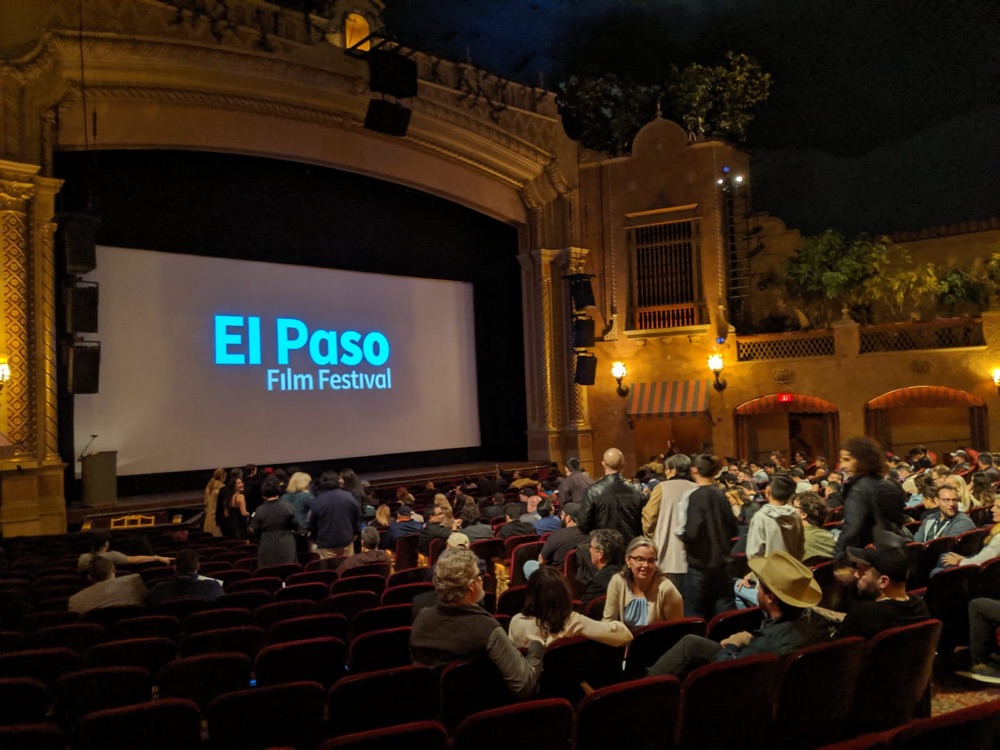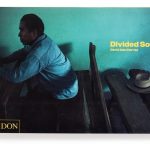By
Erin Coulehan
Photography courtesy of
El Paso Film Festival
As filmmakers and audiences converge on El Paso each year, they’re not just celebrating cinema; they’re embracing the power of storytelling to transcend borders and unite communities.
Since its inception in 2018, the El Paso Film Festival has become a cultural cornerstone for the U.S.-Mexico border region, reflecting its vibrant, multifaceted identity. The El Paso Film Festival serves as more than just a celebration of cinema – it’s a vital platform for amplifying the voices of filmmakers whose stories are shaped by the rich cultural heritage and unique challenges of this borderland we call “home.”
The El Paso Film Festival continues to shine, earning a spot on MovieMaker Magazine’s coveted list of the “25 Coolest Film Festivals in the World.” Founded by filmmaker and artistic director Carlos F. Corral, the festival has become a standout for its vibrant programming, welcoming community, and cross-border creativity.
Tim Molloy, editor of MovieMaker, visited the festival last year and was struck by El Paso’s unique blend of cultural energy. “The easy mix of youthful filmmakers and locals who cross the border as casually as grabbing lunch creates an anything-can-happen vibe,” Molloy said. “It’s comforting to know film communities like this still exist.”
The festival also received accolades earlier this year as one of the “Top Fifty Film Festivals Worth the Entry Fee” and El Paso was named one of the “Top Twenty-five Places to Live and Work as a Filmmaker,” further solidifying the city’s reputation as a creative hub.
By championing independent film, the festival highlights the power of storytelling to bridge divides, connect communities, and celebrate the untapped artistic potential of a region that thrives at the crossroads of two nations.
Executive Director Andrea Calleros recognizes the festival’s potential to expand the cultural reach of the El Paso-Juárez borderland. “We’re building a foundation for storytellers and artists to collaborate and thrive,” Calleros says.
The importance of fostering local and regional film industries is reflected in the economic successes of neighboring states like Texas and New Mexico, where film production has evolved into a significant economic and cultural force. In Texas, known for its vast landscapes and storied history in Westerns and independent cinema, the film industry has brought unparalleled benefits to local economies. Programs like the Texas Moving Image Industry Incentive Program have helped generate over $655 million in economic impact for cities like Fort Worth since 2015, creating tens of thousands of jobs.
These numbers highlight the potential for regions like El Paso to experience similar growth when given the resources and opportunities to attract filmmakers.
“We’re bringing dollars that are from out of town,” explains Corral. “Economically, every production is a big thing because it employs a lot of people. You can have a small crew of eight people, or you can have large crews of 50, even to 200 people. What’s great is that they’re all employed all at once, and they’re all working to make the director or the filmmaker’s vision come true.”
Meanwhile, New Mexico’s meteoric rise as a film and television production hub offers another compelling model.
With record-breaking $794 million in production spending in the 2022-2023 fiscal year and over $5.75 billion invested in the state to date, New Mexico has demonstrated how robust tax incentives and a commitment to fostering local talent can transform the creative economy. From high-profile productions to opportunities for local crews earning competitive wages, New Mexico’s success exemplifies the power of film as both an economic catalyst and a cultural ambassador.
As Texas and New Mexico continue to thrive in the film industry, the El Paso Film Festival is poised to continue to elevate the region by supporting homegrown filmmakers and celebrating stories that reflect the border’s singular identity. EPFF not only contributes to the economic potential of this burgeoning creative field but also affirms the cultural richness of El Paso as a hub where art, community, and commerce converge.
By prioritizing inclusive storytelling and fostering cross-border collaboration, the festival exemplifies how film can be a transformative force – both economically and artistically – in the heart of the Southwest.
“El Paso as a filmmaking community is great. There’s so many artists. There’s so many there’s so many filmmakers. We all know each other. We all get together,” says Corral. “We’ve had Netflix TV shows come through here. Paul Thomas Anderson shot here for several days back in the summer. Then, of course, being close to Las Cruces, being close to New Mexico, I would say it’s our own filmmaking world.”
El Paso’s unique position along the border makes it a melting pot of cultures, languages, and traditions.
Promoting local films allows the region’s stories, perspectives, and experiences to reach a wider audience, showcasing the richness of the community’s bicultural identity. These films offer authentic representations of life on the border, countering stereotypes and broadening understanding.
“We also have a partnership with the El Paso Museum of Art,” says Corral. “We offer three days of free programming that usually includes feature and short documentaries. We bring in really good, eye-opening, films that touch upon topics that range from PTSD in the military, mental health, and incarceration reform.”
Supporting local films fosters a creative ecosystem where emerging filmmakers, writers, actors, and other artists can thrive. It provides them with platforms to showcase their work, build networks, and gain recognition. By spotlighting local talent, El Paso is becoming a hub for creativity and innovation in the film industry – which is where the El Paso Film Festival shines.
“One of our main goals is to be able to amplify the stories that our local filmmakers create. We actually offer specific segments that highlight not only Texas film, but specifically El Paso film,” says Calleros. “As we grow, we’re able to offer them a better platform, so by supporting the festival, you are supporting the specific filmmakers. We’re able to introduce them to seasoned producers that we bring into our festival. We’re trying to help make those connections for them. We’re giving them a space for their own storytelling which is often underrepresented in the media.”
The El Paso Film Festival’s mission is clear: to empower the next generation of filmmakers by providing mentorship, networking, and exposure. This commitment was evident through the partnership with the Creating Ways conference, spearheaded by El Paso Film Commissioner Drew Mayer-Oakes. The festival nurtures emerging talent through its partnership with the “Creating Ways” conference, led by Mayer-Oakes.
Together, they offer workshops, panels, and networking events to help filmmakers grow their craft and careers.
“The El Paso Film Festival isn’t just cool – it’s transformative,” said Mayer-Oakes. “Filmmakers and audiences leave inspired, and special guests always walk away with a true sense of what makes this city so extraordinary.”
Supporting films along the U.S.-Mexico border is vital not only for the stories it generates but also for the opportunities it creates for cross-border collaboration. El Paso’s unique position as a binational axis makes it a natural incubator for diverse voices and perspectives. The festival serves as a bridge between two nations, bringing filmmakers and audiences together to explore themes of identity, migration, and shared humanity.
Jacqueline Baylon, a Mexican filmmaker specializing in civil rights and immigration narratives, is receiving critical acclaim for her documentary Until He’s Back. The film, which explores the heart-wrenching realities of family separation, was recently named one of the big winners at the 2024 El Paso Film Festival and earned a spot on the Academy Awards shortlist for Best Documentary Short Film.
Baylon’s career reflects a passion for storytelling rooted in her upbringing in El Paso, a city that’s rapidly emerging as a creative hub for filmmakers.
El Paso’s emphasis on experimentation has nurtured a generation of artists willing to push boundaries, and Baylon’s work is a shining example of this spirit. Until He’s Back captures the emotional toll of family separation with raw honesty, a theme that resonates deeply in a city defined by its connection to immigration and binational culture.
Corral praised Baylon’s sensitivity and storytelling prowess.
“Her ability to humanize such a complex issue without interference is a testament to her talent,” Corral said. By featuring films that address migration – whether across the Mediterranean or the U.S.-Mexico border – EPFF underscores the interconnectedness of human experiences across geographical divides.
As Baylon continues to earn accolades, her success is a testament to El Paso’s thriving creative scene and its role as an incubator for meaningful, socially conscious storytelling.
With Until He’s Back shortlisted for an Oscar nomination, Baylon’s work underscores the transformative power of stories rooted in personal experience and community. As El Paso solidifies its place on the map for bold and experimental filmmaking, it’s no wonder that its filmmakers are capturing the world’s attention.
Local films often reflect the shared experiences, challenges, and triumphs of a community.
By telling stories that resonate with local audiences, films can foster a sense of pride and unity. Events like the El Paso Film Festival also bring people together to celebrate art and storytelling, strengthening community bonds.
The 2023 Texas premiere of Lost Soulz, a poignant film by Katherine Propper, exemplifies the significance of border filmmaking.
The film tells the story of aspiring rapper Sol, played by Sauve Sidle, a Texas-born recording artist, rapper, model, and actor. As Sol and the musicians head out West, they bond over their shared pains and longings from the lives they left behind.
“The spirit of El Paso – a place where cultures and nations converge – felt very true and specific to the spirit of Lost Soulz,” said Propper. This film is about the coming together of young artists of different backgrounds, making music in Texas.”
Shot partially in downtown El Paso, the movie captures the spirit of the city, a place where cultures and artistry converge. Propper described El Paso as a “fascinating border city” with a creative energy that perfectly complemented her narrative.
The film also spotlighted the acting debut of Krystall Poppin, an El Paso native and rising star in Mexican-American hip hop.
“When I visited the city for the first time, I was blown away by the city’s beauty and the generosity of the people there,” says Propper. “With their help, I looked up Krystall Poppin after learning the film was about music and I got a feeling that she’d be great! ”
Poppin’s extension from the music industry to acting illustrates the boundless talent the city nurtures.
“I’m proud to represent my hometown in my first acting role,” Poppin said, emphasizing her excitement to expand her creative horizons.
The El Paso Film Festival has become a vital platform for this, providing an opportunity for local filmmakers to share their stories and for audiences to experience the rich diversity of the borderland.
One of the highlights of the El Paso Film Festival is the feature-length documentary Blood, Sweat, and Beers by journalist Robert Holguin, which follows The Sloppy Boys, an aspiring comedy rock group, on their journey from Los Angeles to West Texas. At the legendary Sonic Ranch recording studio, the group collaborates with acclaimed keyboardist and producer Money Mark Ramos Nishita, whose storied career includes work with The Beastie Boys, David Byrne, Cypress Hill, Yoko Ono, The Yeah Yeah Yeahs, and more.
“I had a great time recording The Sloppy Boys at Sonic Ranch, but my cell phone thought I was in Mexico the whole time. So the band still owes me 33 thousand pesos,” joked Money Mark.
What unfolds in the documentary is a hilarious and heartfelt exploration of creativity. When three irreverent comedians – Mike Hanford, Jeff Dutton, and Tim Kalpakis – collaborate with Money Mark at Sonic Ranch, they create a comedy-rock classic called Sonic Ranch. Directed by journalist Robert Holguin, Blood, Sweat, and Beers captures the chaotic, inspiring, and wildly entertaining process of making an album in just five days.
“Two of my biggest loves in life are comedy and music,” said Holguin. “This documentary was a perfect way to bring them both together. The notion came to me at the height of the pandemic when I really needed a break from serious journalism. I just thought it would be great for audiences to watch these three hilarious guys try to make music with an incredibly talented producer in a place as magical as Sonic Ranch. The end result is a really funny record and what I think is a documentary that celebrates the art of having fun.”
The Sloppy Boys, known for their raunchy lyrics and absurdly catchy melodies, have carved a niche in the party-rock landscape. With a background in comedy – having starred in IFC’s sketch series The Birthday Boys alongside Bob Odenkirk – the band continues to combine humor and music with projects like their cocktail podcast and now Blood, Sweat, and Beers.
“That film actually didn’t have distribution at the time,” Corral explains. “Robert won the El Paso Filmmaker Award and the Audience Award – everyone loved it!”
Holguin’s success at the El Paso Film Festival helped catapult the film to a broader audience: promoted by the El Paso Film Festival via the Popcorn List, where viewers can now easily stream the film.
“It’s on AppleTV right now,” smiles Corral.
Promoting films like this in El Paso is essential for elevating local stories and fostering a connection between the community and the arts.
The El Paso Film Festival’s commitment to supporting local filmmakers, fostering creative collaborations, and amplifying diverse voices ensures that the region’s unique stories will continue to inspire and entertain audiences for years to come.
Investing in film along the border is not just an artistic endeavor: it’s an economic and cultural one.
Events like the El Paso Film Festival bring filmmakers, artists, and audiences to El Paso, stimulating local businesses and fostering a creative economy. Moreover, the festival’s vision-come-true of becoming an Oscar-qualifying event holds the promise of positioning El Paso as a premier destination for independent filmmaking.
With its commitment to elevating independent filmmakers and promoting El Paso’s dynamic culture, the festival has become a key event in the region’s creative calendar and a haven for storytelling that knows no borders.
















